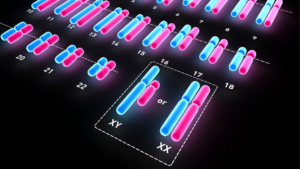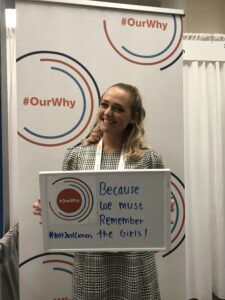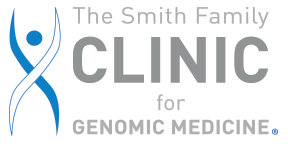By Sarah Sharman, PhD, and Lillie Mermoud
Taylor Kane was in kindergarten when her father passed away from adrenoleukodystrophy (ALD), a rare and fatal genetic disease. Growing up, Taylor always understood she was a carrier for the genetic condition her father died from and knew her carrier status would impact her decision to have a family someday. However, she was told she would not develop symptoms herself.
ALD is an X-linked condition, a group of diseases caused by changes in genes on the X chromosome. The X chromosome is one of the two sex chromosomes in humans, with females usually having two X chromosomes (XX) and males usually having one X and one Y chromosome (XY).
Because males typically only have one X chromosome, any mutation in an X-linked gene will be expressed in males. In females, if one X chromosome carries a mutation for an X-linked condition, the other X chromosome can often compensate for the mutation, potentially preventing the condition from developing. For this reason, X-linked conditions affect men more than women.
Read on to learn more about X-linked conditions, how you can determine your carrier status, and what Taylor is doing to empower women who are impacted by these conditions.
What are X-linked conditions?
The human X chromosome contains more than 860 genes responsible for the development of many tissues, including bone, blood, skin, teeth, neural tissue, and more. There are hundreds of known X-linked conditions, ranging from mild conditions like red-green color blindness to fatal conditions like ALD. In order for a female to develop an X-linked recessive condition, she needs to inherit a mutated copy of the gene from both of her parents. Males only need to inherit one mutated copy of the gene to develop the condition.

Males with X-linked conditions cannot pass the mutated X chromosome to their sons since they contribute their Y chromosome to male offspring. However, they will pass the mutated X chromosome to their daughters, who will only be affected by the condition if their mother also carries the mutated X chromosome.
Women with an X-linked recessive mutation on one X chromosome are known as carriers who can pass the associated condition on to their children, oftentimes without knowing. In each pregnancy, a female carrier has a 50 percent chance of passing the mutated X chromosome to a son who will develop the condition and a 50 percent chance of passing the mutated X chromosome to a daughter who will become a carrier herself.
Unless a woman has a male in her family who has an X-linked condition, women often do not know they are carriers for these conditions. However, having only one affected X chromosome doesn’t always mean that females are symptom-free.
As Taylor got older and met other women in the X-linked condition and ALD communities, she learned there were many women suffering from symptoms of the X-linked conditions they carry. For ALD alone, 80% of women who carry the disease also show symptoms of it. Despite this reality, Taylor saw little support from the medical community for women like her.
“The realization that women who carry or are affected by X-linked conditions are not getting the support they need sparked a fire in me,” said Taylor, who is now the Founder and Board Chair of Remember The Girls, a nonprofit that raises awareness and resources for women with X-linked conditions. “My goal is to help women be aware of their carrier status for X-linked conditions, help them advocate for themselves, and access the resources they need for health, wellness, and family planning.”
Know Your Risk with Genetic Testing
Because most X-linked conditions only require that one parent be a carrier, knowing your carrier status can play an important role in family planning. Being aware of your carrier status can also be valuable information for your immediate family, such as parents and siblings, who may also share your carrier status.

Genetic testing is a powerful way to determine your carrier status for X-linked conditions. Carrier screening is a type of genetic test that can tell you if you have any genetic changes that could lead to health concerns when passed on to your children.
“Carrier screening is empowering for the women who’ve done it,” said Taylor. “Most women who are part of the Remember The Girls community found out they were carriers by doing the test, but we should encourage more women to receive the test. Too many women find out they are carriers after they’ve had a son who is affected by an X-linked condition. By then, it’s too late.”
Knowing your status is also crucial to improving symptom management. Because it is generally thought women cannot be affected by X-linked conditions, women who have symptoms are often misdiagnosed. Symptoms of these diseases are often progressive, so early diagnosis and intervention are key to symptom management and maintaining quality of life.
“Although most X-linked conditions don’t have a cure, knowing your status for X-linked conditions through comprehensive genetic testing can be incredibly impactful. Because females can have symptoms of X-linked conditions, a genetic diagnosis can end the long, expensive, and emotionally challenging diagnostic odyssey and identify symptom-specific treatments that improve quality of life,” said Tanner Coleman, MS, CGC. Tanner is a member of the Remember The Girls Board of Directors and a board-certified genetic counselor who works at HudsonAlpha Institute for Biotechnology and the Smith Family Clinic for Genomic Medicine. “Additionally, knowing your status can help you connect with researchers, clinical trials, and communities of families with shared experiences.”
Empowering women through advocacy
Even though ALD has had a negative impact on Taylor Kane’s life, she says being a carrier hasn’t been a negative experience for her.
 “Being able to grow up knowing I’m a carrier has helped me understand my options for having a family down the line. It’s given me time to adjust to the psychological impact of that knowledge, and I have resources in place should I develop symptoms as I get older,” said Taylor. “My experience has also given me the drive and opportunity to help other women who struggle with an X-linked condition.”
“Being able to grow up knowing I’m a carrier has helped me understand my options for having a family down the line. It’s given me time to adjust to the psychological impact of that knowledge, and I have resources in place should I develop symptoms as I get older,” said Taylor. “My experience has also given me the drive and opportunity to help other women who struggle with an X-linked condition.”
Through Remember The Girls, Taylor advocates for women impacted by X-linked conditions and connects them with resources to find the medical, psychological, and social support they need. On the organization’s website, women can find everything from a detailed look at how X-linked conditions work, guides on family planning, and even a self-advocacy kit that helps women advocate for themselves during visits with physicians.
The organization itself started off as a Facebook group dedicated to women in this community, acting as a place where women can share their experiences as well as resources. From there, Remember The Girls has grown to include an educational mission area to help the medical community better support women affected by X-linked conditions, as well as a research mission area that funds scientific research seeking to understand these life-changing conditions better.
As the organization has grown, Taylor’s goal to empower women and bring them together has not wavered. “Growing up, I saw firsthand the power of women who are impacted by X-linked conditions. We can come together and advocate for change and improvement in a meaningful way,” said Taylor. “Through Remember The Girls, we have a chance to meet women we could never have met otherwise and to do incredible work for good together.”


